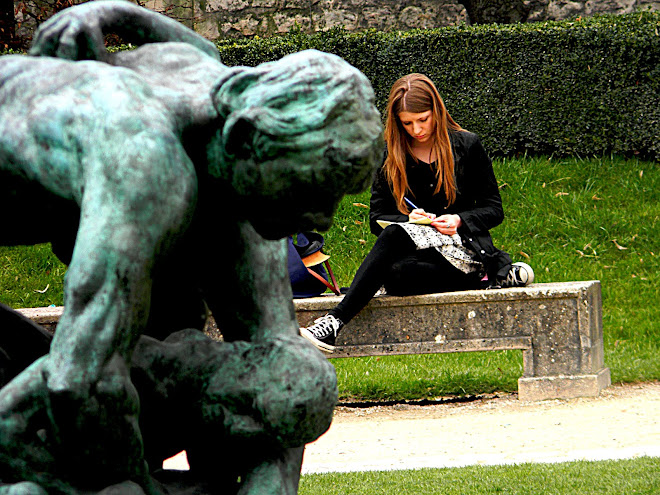[has/have + been + present participle]
Ex: I have been hoping.
The other day I was talking to someone about an essay I
wrote just over a year ago. I always
thought the essay was a contemplation on love but they said it was about time. Maybe love is about time. I first had this thought two months ago, when
my best friend and her boyfriend of seven years came to visit me in New York. Sitting across the table from them during
dinner, I noticed how each carried the history of the other in themselves. They were a movable measurement of seven
years (and counting) of each other’s lives.
Mapped across my best friend’s memory was every small injustice, every
accomplishment, every childhood story of her boyfriend. In in him, was a record of every hardship she
had endured, everything she had built for herself and everything they had built
together. In the two of them, I saw also
the absence of time—or, perhaps, the irrelevance of time. In the beginning, they would have counted
dates—first date, second date… And then
months. And then firsts—first time
sleeping together, first Valentine’s day, first vacation together, first anniversary… And then as they began to count years, the
years added up to timelessness. Because
it is all there simultaneously in their memories of each other.
I think a lot about time.
In job interviews lately, I find myself repeatedly asked, “Where do you
see yourself in five years?” In five
years I will be twenty-eight (almost twenty-nine) years old. In interviews, I make up an answer. In conversations with friends, I laugh and
say I can’t possibly picture where I’ll be in five years. That’s a lie too. I know where I want to be in five years, I
just don’t want to say it. It feels like
a wish—if you tell someone what you wish for, it won’t come true. And yet, in some ways it’s difficult to
picture myself a year from now. In fact,
it’s difficult to picture two months from now.
But that is because I know how time moves slowly until suddenly it jumps
and starts running until it gets tired.
Time needs to learn to pace itself.
It seems that big changes happen suddenly. Love happens suddenly. One day you just realize it’s there, in the
picture. Of course, it also happens over
time. Love is time and
timelessness.
Time is largely about counting. I can count the time I’ve been in New
York. One year and ten months. I can count the months I’ve been at the new
job that I told myself would only be temporary.
Two months—and that already feels too long. I can count the time since I last saw my
family. One year. And then there are other things that I have
lost count of. Dates, days, kisses,
small gestures… Time is about
counting. It’s also about what
counts. Months can go by and yet they
only really count in terms of the slow progression of life on a calendar. And then there are other months, days,
minutes, seconds, that feel like they make it all count.
Recently, I find myself feeling timeless—ageless. Entirely grown up with a job and a graduate
degree and bills and business suits. And
also eternally youthful—screaming on carnival rides and eating candy and
laughing and forgetting I have any responsibilities other than my own
happiness. A year ago, when I was
writing about love—or time—I felt old and aging. I felt like time was stretching across my
face and the relationship I was in, leaving everything wrinkled and worse for
wear. And I thought life would be like
that, slow and disappointing, forever and ever until it was just over.
I don’t feel that way anymore. I feel renewed and hopeful and I feel like
that counts for something. And maybe
none of this is any sort of great revelation or insight into the human
condition, but I am at work with four hours left in the workday and this is my way
of killing time—or, maybe, making it count.



Great work !!
ReplyDeleteTül Perde Modelleri
ReplyDeletesms onay
mobil odeme bozdurma
Nft nasıl alınır
ankara evden eve nakliyat
trafik sigortası
DEDEKTOR
WEBSİTE KURMA
aşk kitapları
sancaktepe
ReplyDeletesarıyer
serdivan
şile
silivri
K54
bakırköy
ReplyDeletebodrum
izmir
kumluca
osmaniye
Z4DG
salt likit
ReplyDeletesalt likit
MYDXBC
https://saglamproxy.com
ReplyDeletemetin2 proxy
proxy satın al
knight online proxy
mobil proxy satın al
OLENV6
adapazarı
ReplyDeleteadıyaman
afyon
alsancak
antakya
R6Z
شركة مكافحة الحمام بالدمام 36sESDXqLe
ReplyDelete